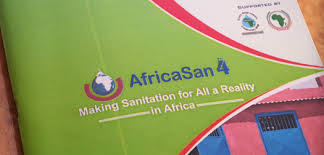Rising from the three-day 4th African Sanitation and Hygiene Conference tagged “AfricaSan4″, African leaders have issued the “Ngor Declaration on Sanitation and Hygiene”, which aims to achieve universal access to adequate and sustainable sanitation, safe hygiene services and eliminate open defecation by 2030.
 They also reaffirmed their commitment to the human right to water and sanitation for all for all Africans, and pledged to work towards progressively eliminating inequalities that currently deny about 547 million people in Africa access to safe sanitation.
They also reaffirmed their commitment to the human right to water and sanitation for all for all Africans, and pledged to work towards progressively eliminating inequalities that currently deny about 547 million people in Africa access to safe sanitation.
Another major highlight of the declaration is a commitment by countries to fund sanitation and hygiene budget to a minimum of 0.5% of GDP by 2020.
The triennial AfricaSan organised by the African Ministers’ Council on Water (AMCOW) aims to address Africa’s sanitation challenge including helping agencies and governments shape strategies for action at many levels. Mainly attended by sanitation technical experts, it provides a forum to to exchange lessons, to identify approaches and technologies that work best in their local circumstances. This 4th AfricaSan water held in Dakar, Senegal, last week.
Text of the “Ngor Declaration on Sanitation and Hygiene” adopted by the African Ministers responsible for sanitation and hygiene on 27 May 2015 at AficaSan4.
Preamble
We, the Ministers and Head of Delegations responsible for sanitation and hygiene in Africa, together with senior civil servants, academics, civil society, development partners and private sector at the 4th African Conference on Sanitation and Hygiene (AfricaSan), convened by the Government of Senegal with support from the African Ministers’ Council on Water (AMCOW) in Dakar, Senegal, May 25-27, 2015
- Recognising that while an estimated 133 million people living in Africa gained improved sanitation since 1990, the level of progress has not kept pace with demograpic change; many countries do not have adequate high-level leadership, financial and human resources to implement existing policies, fail to tackle equity, do not build, manage or maintain sanitation system and services, or create the large-scale hygiene behaviour change;
- Mindful that an estimated 61% of people living in Africa do not have access to improve sanitation and that 21% still defecate in the open;
- Noting that this lack pf access to improved sanitation together with poor hygiene practice result in a huge burden of disease and that the associated economic, human, social, health and environmental costs are a major burden on African countries;
- Reaffirming the human right of safe drinking water and sanitation for all;
- Welcoming the aspiration of the draft Sustainable Development Goals which include an explicit target to “By 2030, achieve access to adequate and equitable sanitation and hygiene for all and an end to open defecation, paying special attention to the need of women and girls and those in vulnerable situations” committing to integrating these in national policies and plans;
- And recognising that the time has come to incorporate the lesson from the eThekwini commitments and replace them by the “Ngor Declaration on Sanitation and Hygiene”, setting out in particular clear indicator for monitoring progress;
The Vision articulated by African Ministers responsible for Sanitation and Hygiene at African 4, Dakar, Senegal, is summarised below:
Achieve universal access to adequate and sustainable sanitation and hygiene services and eliminate open defecation by 2030.
Commitments
To realise this vision, our governments commit to:-
- Focus on the poorest, most marginalised and unserved aimed at progressively eliminating inequities in access and use and implement national and local strategies with emphasis on equity and sustainability;
- Mobilise support and resources at the highest political level for sanitation and hygiene to disproportionately prioritise sanitation and hygiene in national development plans.
- Establish and track sanitation and hygiene budget lines that consistently increase annually to reach a minimum of 0.5%GDP by 2020;
- Ensure strong leadership and coordination at all levels to build and sustain governance for sanitation and hygiene across sectors especially water, health, nutrition, education, gender and the environment;
- Develop and fund strategies to bridge the sanitation and hygiene human resource capacity gap at all levels;
- Ensure inclusive, safely-managed sanitation services and function hand-washing facilities in public institutions and spaces;
- Progressively eliminate untreated waste, encouraging its productive use;
- Enable and engage the private sector in developing innovative sanitation and hygiene products and services especially for the marginalized and unserved;
- Establish government-led monitoring, reporting, evaluating, learning and review systems;
- Enable continued active engagement with AMCOW’s AfricaSan process.
We further call on:
- All people living in Africa, especially the youth, to utilize and maintain sanitation and hygiene services with propriety and dignity;
- AMCOW to prioritise and facilitate adequate resourcing for sanitation and hygiene by mobilising dedicated, substantive new sources of financing;
- AMCOW to facilitate the establishment and management of systems and processes for performance monitoring and accountability against the Ngor Declaration;
- Training institutions in Africa to strengthen local capacity to deliver appropriate services in line with demand;
research institutions in Africa to strengthen the evidence base and develop innovative locally appropriate solutions; - Civil society in Africa to forge a cohesive, coherent and transparent vision and strategy to work with all stakeholders to achieve the Ngor Declaration;
- Traditional institutions, religious leaders and faith based organisations to strongly support equitable sanitation and hygiene activities in their communities;
- The private sector to increase its engagement in the entire sanitation and hygiene value chain to improve innovation and efficiency;
- Development banks, donors and partners to increase their support to government led efforts for universal access to sanitation and hygiene and to match this financial support with responsible accountable engagement.
And in recognition of this we make this declaration in Ngor, Dakar on 27th May, 2015.
